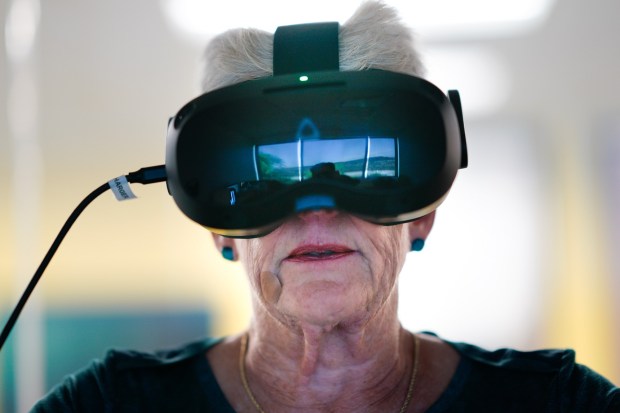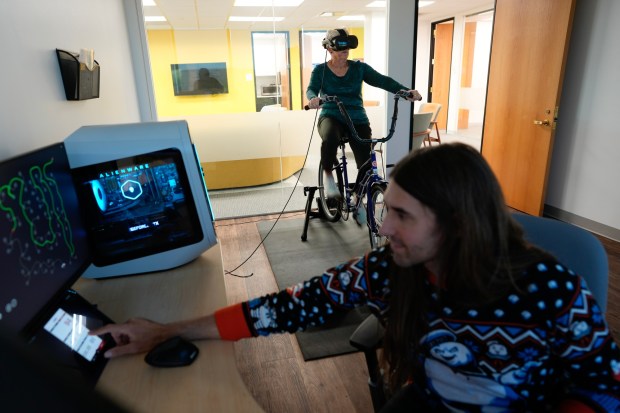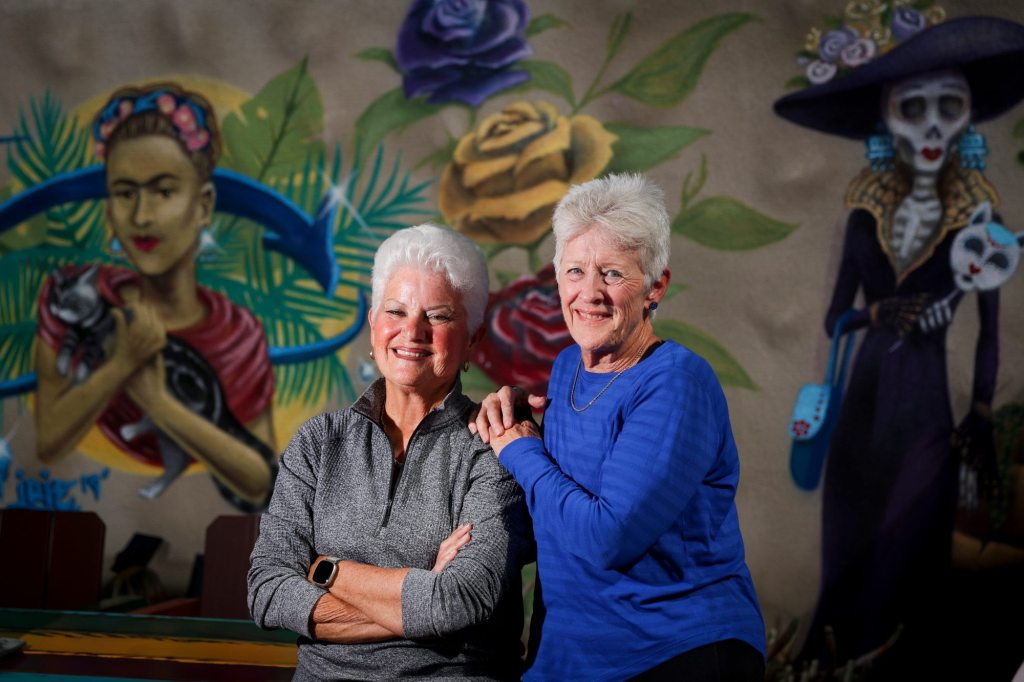Most people hear the words “spinal tap,” and they are dancing to the British heavy metal band in the movie. But if the reference is to your back, most people would imagine a large needle and run for cover.
Sharen Gibson, 72, never flinched.
“The first thing I ever volunteered for, and probably quite off-putting to my friends, was a spinal tap,” Gibson says matter-of-factly about her participation in a UC San Diego memory study. She describes the procedure with the casualness of someone discussing their morning coffee routine: a tiny needle, five minutes, two vials of spinal fluid and some extra water afterward — “no more than what they’d suggest if you donate blood.”
Gibson and her spouse Roxanne Hoffert, 66, represent a growing number of older adults volunteering as healthy participants in clinical trials, contributing to medical research not because they’re sick, but because they want to help prevent others from getting sick.
“I went to my high school reunion, looked around at some of these women, and it’s like, can you eat a salad every once in a while?” Gibson says. “I am not going to age without kicking and screaming.”
Gibson retired six years ago from FedEx, and Hoffert retired from Qualcomm more recently. The couple live in University Heights.
Gibson is enrolled in WITS (Women: Inflammation and Tau Study) at UC San Diego, which examines why women are disproportionately affected by Alzheimer’s disease. Women comprise two-thirds of Alzheimer’s cases and are almost twice as likely to develop the disease than men.
Dr. Sarah Banks, who leads the study with co-principal investigator Dr. Erin Sundermann, explains that women show different biological patterns in the progression toward dementia. “The mild cognitive impairment stage starts when women get a big burst in the tau protein.”
Tau is a protein that often spreads after inflammation in the brain, and women tend to have stronger inflammatory reactions than men. It can ultimately disrupt the cell transport system, leading to neuron damage and potentially death. The five-year, $7 million National Institutes of Health-funded study is examining how modifiable risk factors — sleep, diet, exercise — might impact Alzheimer’s, specifically in women. The study would like 45 more participants who are 65 years or older.
For Gibson, participation meant undergoing a tau PET scan to detect protein buildup in her brain, cognitive testing, blood work and that spinal tap. A year later, she’ll repeat the process. The spinal fluid, she learned, “completely flushes the brain five times a day,” making it an ideal window into brain health.
One unexpected finding, according to Banks, has been the prevalence of undiagnosed sleep apnea among participants. About 70 percent of the women in the study have undetected sleep apnea, a significant discovery since untreated sleep apnea is a risk factor for cognitive decline.
“Women present sleep apnea symptoms differently than men,” Banks explains. “We’re less likely to snore loudly and gasp. We’re more likely to have non-specific symptoms like not feeling very alert and grogginess the next day and headaches.” After menopause, women are equally likely as men to develop sleep apnea, but they’re less likely to be tested or diagnosed.
Hoffert is in the Brain Research Health Study, which combines exercise with virtual reality gaming for some participants. Three times a week for 16 weeks, she goes to UCSD to play a specially designed VR game as part of research examining how different types of cognitive training might benefit brain health.
 Roxanne Hoffert participates in the Brain Research Health Study at UCSD in San Diego. Hoffert takes a VR tour riding a stationary bicycle three times a week for the next 16 weeks, lasting close to 30 minutes on each tour. (Nelvin C. Cepeda / The San Diego Union-Tribune)
Roxanne Hoffert participates in the Brain Research Health Study at UCSD in San Diego. Hoffert takes a VR tour riding a stationary bicycle three times a week for the next 16 weeks, lasting close to 30 minutes on each tour. (Nelvin C. Cepeda / The San Diego Union-Tribune)
 Roxanne Hoffert, takes a VR bicycle tour as part of a study for the Brain Research Health Study at UCSD. Hoffert’s advice for others considering clinical trial participation? Explore your options and think about the bigger picture. It won’t kill you, and it may change other lives. (Nelvin C. Cepeda / The San Diego Union-Tribune)
Roxanne Hoffert, takes a VR bicycle tour as part of a study for the Brain Research Health Study at UCSD. Hoffert’s advice for others considering clinical trial participation? Explore your options and think about the bigger picture. It won’t kill you, and it may change other lives. (Nelvin C. Cepeda / The San Diego Union-Tribune)
“I see why kids are addicted to it,” Hoffert says of the virtual reality experience. The time commitment is substantial —each session requires several hours, including travel and parking. Participants receive $585 in cash and transportation assistance when needed. Some volunteers also get a quilt. Since 2010, several quilt guilds across the nation have donated nearly 200 quilts to volunteers in various aging brain studies at UCSD.
“The goal of the study is to look at different factors that impact brain health and how changes in behavior – diet, exercise, sleep – might be useful in treating the disease,” said Dr. Judy Pa, co-director of the Alzheimer’s Disease Cooperative Study and Shiley Chair of Alzheimer’s Disease Research at UCSD.
The study needs 39 more female volunteers to complete their goal of 110 participants, all women 65 and older who don’t currently have dementia.
Gibson and Hoffert’s advice for others considering clinical trial participation? Explore your options and think about the bigger picture. It won’t kill you, and it may change other lives.
“If you have your own issues, or have loved ones with issues that have unique medical problems, take a look,” Gibson suggests. “Alzheimer’s is not inevitable, dementia is not inevitable. Make a stand.”
If you are interested in learning more about clinical trials, UCSD’s healthy volunteer studies website lists current opportunities. The WITS study can be reached at (858) 761-3802, and the Brain Health Research Study at 619-543-3494.
Sometimes changing the world starts with a tiny needle.
I’m interested in writing a column about seniors who are working part-time. Please email me with your suggestions at bbry@askturing.ai.

